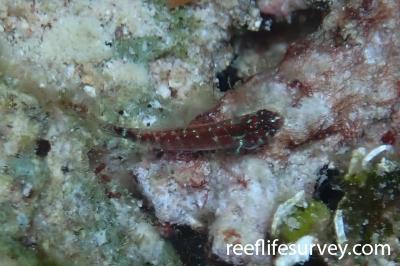Eviota prasites
Hairfin Eviota | Hairfin Pygmygoby | Prasites Pygmygoby | Red And White-spotted PygmygobySimilar Species
Same Genus
Distribution
Tropical Indo-Pacific
Description
Translucent body, red stripe along spine with dashes along upper margin and white blotches along underside. Additional row of white spots over belly only. Distinctive red line running from tip of lower jaw, under the eye, and across the cheek. Dark spot at top of pectoral fin base and at caudal fin base below midline may be lacking or absent in live specimens. Similar species E. spilota (Shoulderspot Eviota) may be distinguished by presence of dark spot at pectoral fin base.
Information
Max Size: 3 cm
Sea Temperature Range: 22.9-31.2°C
Depth: 1-30m
Habitat Generalization Index: 2.53
Also referred to as the SGI (Species Generalisation Index), this describes the habitat niche breadth of the species. Species with values less than 15 are found in a relatively narrow range of reef habitat types (specialists), while those over 25 may be found on most hard substrates within their range (generalists). Learn more here.
Conservation and Rarity
IUCN Status: Not Evaluated
Occurrence: Common (32.3% of sites)
Occurrence describes how often the species is found on surveys within its distribution. It is calculated as the % of reef sites surveyed by RLS divers across all the ecoregions in which the species has been observed
Abundance: Several (5 per transect)
Abundance is calculated as the average number of individuals recorded per RLS transect, where present.
Edit by: Jo Schmid







































![Eviota sp. [atriventris]](https://images.reeflifesurvey.com/0/species_37_5770b511d1962.w400.h266.jpg)
![Eviota sp. [cf bifasciata]](https://images.reeflifesurvey.com/1/species_70_68524018a0cb6.w400.h266.jpg)
![Eviota sp. [cf hosei]](https://images.reeflifesurvey.com/0/species_df_5770b5f6989eb.w400.h266.jpg)
![Eviota sp. [cf nigriventris]](https://images.reeflifesurvey.com/0/species_c1_573b0a519cd4b.w400.h266.jpg)
![Eviota sp. [cf punctulata]](https://images.reeflifesurvey.com/1/species_42_66c2b2b928e51.w400.h266.jpg)
![Eviota sp. [cf sigillata]](https://images.reeflifesurvey.com/1/species_07_684ba5cf2eecb.w400.h266.jpg)
![Eviota sp. [green]](https://images.reeflifesurvey.com/0/species_80_5757cfea7fd7c.w400.h266.jpg)
![Eviota sp. [nigriventris]](https://images.reeflifesurvey.com/1/species_b2_6494386287366.w400.h266.jpg)
![Eviota sp. [punctulata]](https://images.reeflifesurvey.com/1/species_a6_5ed49d26020c3.w400.h266.JPG)
![Eviota sp. [red eyes]](https://images.reeflifesurvey.com/1/species_35_6494374b9c42b.w400.h266.jpg)
![Eviota sp. [Snowflake]](https://images.reeflifesurvey.com/1/species_ec_649437c794466.w400.h266.jpg)
![Eviota sp. [storthynx gold shield]](https://images.reeflifesurvey.com/1/species_92_5ed49f8478cfa.w400.h266.jpg)
![Eviota sp. [trans white & red streaks]](https://images.reeflifesurvey.com/1/species_2a_5ed4a2c15106d.w400.h266.JPG)
![Eviota sp. [translucent]](https://images.reeflifesurvey.com/0/species_f6_5770b960aa2c5.w400.h266.jpg)
![Eviota sp. [zebrina cf]](https://images.reeflifesurvey.com/1/species_f0_68524fb3e6501.w400.h266.jpg)

